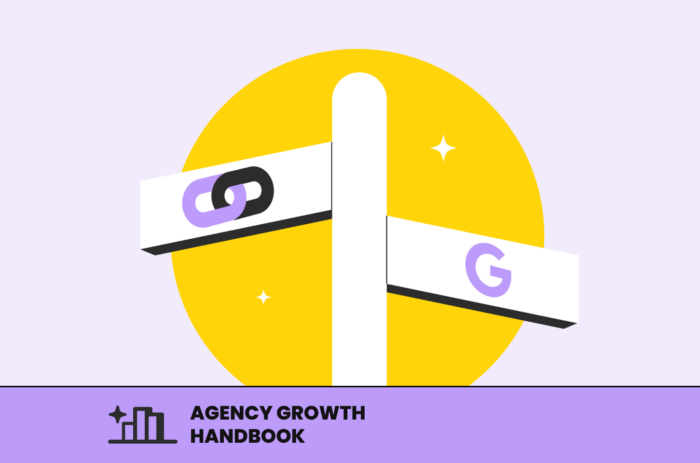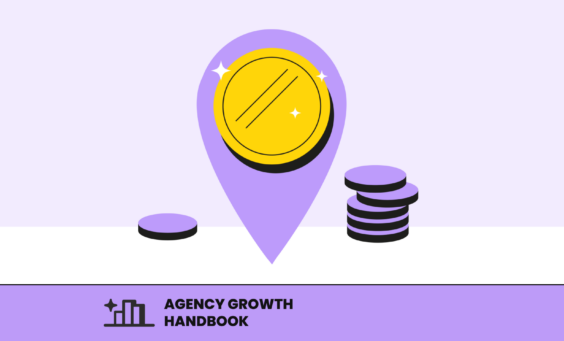This article is from our Agency Growth Handbook—a collection of guides created to help local SEO agencies grow and succeed. It is chapter one of ‘Part One: Pitching and Onboarding‘.
The guide takes inspiration from Claire Carlile’s Academy course ‘How to Win Your First Local SEO Client’.
Setting up a new local SEO agency is exciting. Being your own boss, working on your terms, and doing things your way is a hard gig to beat. It’s professionally and personally rewarding. One thing it isn’t, though, is easy.
Whether you already run an agency but feel it’s time for a reset, want to add local SEO to your other digital offerings, or are a consultant ready to scale up to agency owner, getting started requires considerable upfront planning.
The sheer volume of tasks you’ll need to complete before launch day can feel daunting. Many of the decisions you need to make come with a huge side order of pressure. That’s because each decision directly impacts the direction of your new business and its chances of success (or failure).
Free Agency Course: How to Win Your First Local SEO Client
That’s where we come in. Our Agency Growth Handbook is your blueprint for starting your new local SEO agency.
Defining Your Services
Before you can successfully launch your business, you need a clear idea of what you’re going to sell. You might think that’s the easy bit. After all, it’s a local SEO agency, so the clue will be in the name, right? Not exactly.
In today’s search landscape, local SEO is a broad umbrella term for a rapidly growing range of tactics and specialisms. That means you could opt to focus on just one or two niche areas of expertise, such as:
- Google Business Profile Optimization
- Reputation Management
- Local Link Building
- Copywriting
- Citation Building
- Data and Analytics
- Social Marketing
- Technical Optimization
If you read that list and answer, “Check. Check. Check,” you may feel you’re sufficiently experienced and knowledgeable to offer a full-service local SEO solution. When you’re building a new business, it can be tempting to try and do it all. However, it’s essential to consider your strengths and weaknesses and whether you have the budget to fill any skills gaps with freelancers, subcontractors, or full-term hires.
That means your options are:
| Be a specialist: | Be a full-service generalist: |
|---|---|
| You want your agency to be known as the expert provider of a specific local SEO tactic. You'll pick just one or two parts of the local SEO mix (for example, Google Business Profile optimization or local link building) and go all-in on those. Your service menu will be built entirely around precise elements with advanced solutions. To create a niche local SEO agency, you'll need to be a subject matter expert in your chosen area. This area should be one that you enjoy, excel at, and are committed to keeping up to date with. | You don't want to be pigeonholed or restricted to just one or two tactics. Instead, you want to be able to offer a broad spectrum of services, ranging from copywriting for local landing pages to local link building and review management. The great thing about taking a full-service approach is that your work will be varied, and you'll have the chance to hone your skills across a wide range of marketing tactics. Because you'll be wearing many different hats, you'll be able to try new things and figure out what you do and don't enjoy. You might discover a hidden skill or aptitude for a particular tactic that you didn't know you possessed. |
Whether you’re more inclined to be a niche expert or launch a full-service local search marketing agency, there’s another critical question that you’ll need to consider. Do you want to fly solo, or are you interested in building a bigger business with a team of experts working for your agency?
Determining what scale you want to achieve is a very personal decision. There’s no right or wrong answer; it comes down to what you want from life.
Some people are drawn to the solopreneur lifestyle because they can stay in complete control. Being a solopreneur means you’re only responsible for yourself. You don’t have the pressure of making payroll each month, nor do you have to take on a manager role. It can be the more flexible path, at least initially, and affords a greater amount of personal freedom.
That said, if you’re serious about building an agency, bringing in other local SEO experts can help you develop your service portfolio and offer a more comprehensive solution to clients. It also gives you more man-hours and resources, which means you can take on more clients, generate more turnover, deliver better results, and not have to do everything yourself.
How to Build and Grow Your Digital Marketing Agency
Let expert Greg Gifford show you how to take your agency to the next level, in this course filled with tactics and processes for steady and successful growth.
What kind of local businesses will you target?
With your business’s organizational structure decided, you can now start to think about who you will sell your services to. This is your client niche, and it can be a whole lot trickier to settle on than it may first appear. Your client niche could be determined by a specific industry, a certain size of business, or a local area.
There are a couple of clear advantages to saying that you’re only going to work with this kind of client.
Advantage 1: You have the chance to become a big fish in a small pond
If 100% of your efforts and results come from a single sector, you can expect to become an established authority within that vertical. That depth of expertise means your services should become highly prized within that target niche.
Let’s say you decide to work only with dentists. With a few happy clients and excellent results, word should soon spread through the dental community. Any dentist looking to grow their local search visibility will know that you can get the job done. There could even be an increased desire to work with you to gain the upper hand over local rivals.
Advantage 2: You’ll have a unique insight into search trends
Choosing to work with just one type of client allows you to immerse yourself fully in that sector’s search landscape. You’ll instinctively learn what works and what doesn’t because you’ll work with the same kinds of businesses and keywords daily.
Essentially, you’re developing your own substantial back catalog of search algorithm intelligence.
This unique insight cuts down on the guesswork associated with running new local SEO campaigns. It allows you to deploy tactics you’ve tried and tested and feel confident they will move the needle in the right direction from day one. And it means you’ll deliver consistently strong results for your clients.
Advantage 3: As a specialist, you can focus on what you do well
Having a particular niche—whether that’s an industry you have a particular affinity for or a certain size of client business you prefer to work with—can help you avoid a common trap associated with running a business: spreading yourself too thin. You can focus on what you enjoy and know you do well because you aren’t trying to be all things to all clients.
Advantage 4: Day-to-day operations can be streamlined
There are plenty of practical advantages to having a well-defined niche. Many service providers define their client niche by geographical area. Service businesses like plumbers, electricians, and HVAC technicians define their niche by radius.
Staying within your geographical area can also make day-to-day operations smoother. It makes it much easier to host client meetings, travel to networking events, and pitch to new businesses.
Advantage 5: Your marketing and messaging can be tightly focused
Knowing your audience is one of the golden rules of successful marketing. For your sales and marketing efforts to resonate, you need to understand who you’re talking to and what their challenges are. You should be able to clearly articulate how you can help them specifically.
If you don’t have a niche:
- Your sales messaging could be too generic to generate a connection.
- Your pitch decks could leave your prospects cold.
- Your advertising could fall flat.
A real estate agent, for example, will have different priorities than a mom-and-pop convenience store. A veterinarian won’t be looking to solve the same search problems as a locksmith. A restaurant will expect different results from a lawyer. Only by having a clear idea of your audience will your marketing and sales messaging hit their mark.
Despite these clear advantages, there are some pitfalls to deciding on a client niche.
Pitfall 1: Your niche is too narrow
While there are genuine benefits to having an area of expertise, your niche must be able to sustain your new agency. There must be enough of those kinds of businesses to keep your business in business. You could quickly run out of clients if your focus is too specific.
Opting to only work with surf shops in Nevada, for instance.
Pitfall 2: Industry downturns will impact your business too
If your agency focuses on a particular industry or a specific type of business, any downturn in that vertical will also hit your business hard. A change in that market could render your services no longer required, jeopardizing your entire agency business. While that may seem like an extreme scenario, you only have to cast your mind back to the industries entirely shut down by the pandemic or made obsolete by the surge in online services to understand how quickly things can change.
Pitfall 3: Too many clients request non-competition clauses
Being super successful in your niche is a beautiful thing—your clients know they can trust you to deliver results. But what happens when they don’t want you delivering those same results for their main rival across town? Having a client with a non-competition clause could put dozens of other businesses out of bounds in one fell swoop.
You can’t afford for your niche to be too narrow that you run out of new clients you’re permitted to work with.
Taking on the Pricing Conundrum
If there’s one thing guaranteed to keep any business owner awake at night, it’s cash. Setting your agency pricing model is no small feat, and it’s also far from straightforward.
As a new business, you may be tempted to price your services lower to attract clients. That could mean you need to charge more to cover your overheads and make a profit. You could be toying with charging more to value your skillset. But set the bar too high, and you could price yourself out of the game before you begin.
The key to creating a sustainable pricing model that reflects the value you bring to your clients, keeps the lights on, and doesn’t send prospects running for the hills is to work systematically and impartially through the process.
Step 1: Decide on Your Pricing Model
There are many different pricing models for SEO and digital marketing agencies. You need to decide what yours will be. Will you charge per hour or go for a fixed monthly or quarterly retainer? An hourly rate can initially seem more affordable for clients, but it’s also less transparent and makes budgeting much harder. You may also find it harder to make financial forecasts and plan as the hours you bill (and therefore how much you make) will likely fluctuate monthly.
A fixed fee can initially be off-putting for some businesses, especially smaller enterprises. It may feel like a big commitment, but it should be a much more precise cost to manage each month. A monthly or quarterly retainer also gives you some security and certainty, so you can accurately forecast turnover or confidently take on a new staff member.
Some service providers operate a pay-on-results model. This is perhaps the most difficult model to understand as a client and local SEO agency. It requires a lot of forward planning because you’ll need to have an ironclad agreement in place that clearly defines the result being targeted, what that success looks like in practice, and how long it will take. You’ll also need to clearly understand how long the desired outcome will likely take and ensure that the input costs don’t outweigh the reward.
Step 2: Work Backwards From There
Once you know how you will charge, you can start to think about what you will charge.
- Do your research: You don’t want to under or overprice your services. As a first port of call, try to understand what other local SEO providers are charging in your area. Some agencies may have pricing guidelines on their site to give you a ballpark figure. Friends, family members, and acquaintances may have their own experiences working with other agencies. Ask them how much they paid. If you’re a member of a local Chamber of Commerce or attend networking events, feel free to ask local business representatives what they have or would expect to pay for local SEO support.
- Be creative: If those avenues leave you drawing a blank, go online. Many smaller agencies and solo service providers use freelance and on-demand platforms to find work. Many of those platforms allow providers to post fixed-price jobs. Review standard costs to build up an idea of average pricing. Some sites will also show you past reviews and the number of clients worked with, helping you understand if that service provider has got it right and is winning new business.
- Calculate your outgoings: One of the most important defining factors in your pricing model is the amount of cash you need to cover your outgoings. Create a list and tally it up. Include any business expenses such as rent, Wi-Fi, staff costs, equipment costs, and software subscriptions. Remember things like taxes and healthcare insurance. Next, think about your personal circumstances and how much money you need to make each month to live comfortably.
Carving out Your Place in the Market
Local SEO is a competitive space. You must be clear on your market position to ensure you stand out. This goes beyond your niche. It isn’t just about what you do and who you serve. It’s more nuanced. It’s about storytelling and weaving a compelling narrative that helps your target market understand your value and what makes you different.
Your Positioning Statement
Writing a positioning statement is an excellent way to focus your thinking and clarify your mission. It is a very short piece of text (around three sentences or so), but don’t be fooled. Less can be surprisingly more difficult.
To create yours:
- State who you’re targeting and what their problems or opportunities are.
- Outline what your service is and the main benefit you bring to the table.
- Identify your competitive differentiator.
Once you have formulated this statement, you’ll be able to clearly convey what you bring to the table, how you can help your clients succeed, and how your solution differs from competitors.
You can refer to this document anytime you need to center yourself and check whether you’re continuing on the right path.
Generating Leads
Lead generation is one of those jobs that you can never tick off your to-do list as an agency owner. But, as a local SEO practitioner, the good news is that you’ll already be well-qualified to market your agency’s offerings.
It should go without saying that many of the tactics and methods you use to boost your client’s search visibility should be applied to your own business:
- Create, optimize, and manage your Google Business Profile.
- Build a website and regularly add helpful, original, optimized content.
- Start local link building.
- Build citations.
- Be proactive about asking clients for reviews.
- Be active on social media.
- Participate in local and industry events.
- Share valuable tips with your network.
- Seek media coverage and other forms of local exposure, such as volunteering to speak at a Chamber of Commerce event or participating in a podcast.
Generating leads is often about sharing your expertise and offering your insight. There’s an educational aspect that not only provides useful information to your prospects but also allows you to showcase your expertise. This doesn’t just build trust in your agency; it can also build goodwill.
Aside from the local SEO tactics you already know and are proficient in, there are many other ways to generate leads. Raising your local visibility can make a huge impact. Why not host a free seminar for local businesses within your client niche? You could also donate your time to a local non-profit in return for a testimonial or reference on their website. If you’re confident in front of the camera or happy to appear online, another great tactic is to approach local media about guest author spots.
You could also consider creating a presence on one of the many on-demand platforms. These platforms already have a volume of traffic you can benefit from, and you can instantly connect with local businesses actively looking for local SEO solutions. This is also a great way to quickly build up a store of reviews, which you can then use as social proof to generate additional leads for your new local SEO agency business.



